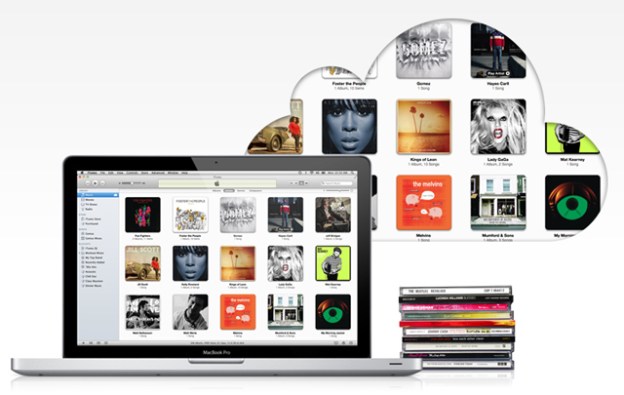
Apple’s awaited iTunes Match service is (technically) now available by updating to the newest version of iTunes (10.5.1). Originally expected to launch in October, iTunes Match allows paying subscribers to access all of their music (up to 25,000 songs) on any of their Apple devices through iCloud. Unfortunately, Apple’s servers appear to already be overloaded with people trying to access the new service, reports Fortune, meaning you’re going to have to wait at least a few hours — maybe even days — before you can sign up for iTunes Match.
In addition to making iTunes libraries accessible across all of a user’s iDevices, iTunes Match, which costs $24.99 per year, will upgrade all tracks to iTunes quality (i.e. 256Kbps AAC DRM-free), regardless of whether or not the songs were purchased from iTunes, ripped from a CD or downloaded through some other channel. (Like, say, BitTorrent.)
Rather than upload your library to iCloud, iTunes Match scans your machine to see which tracks you have on your computer. It then give you access to all of those tracks through your iCloud — but only if they are available through the iTunes Store. That means if you have music that isn’t available on iTunes, like, say, live recordings of your ska band from high school, you’re going to have to sync that to your variety of devices just as you always would.
The iTunes Match release has a number of other stipulations. First, the service is currently only available to customers in the US, due to agreements with the music industry. Second, Apple has slapped the “beta” label on iTunes Match, meaning it probably has a few bugs. Fortunately, Apple will give you an extra three months of the service for free.
If you’re one of the lucky ones who was already able to sign up for iTunes Match, let us know what you think of it in the comments. And if you weren’t, let us know what you think of that in the comments, instead.
Editors' Recommendations
- AirPods, Beats owners can get Apple Music free for 6 months
- How to share your iTunes library
- We can’t believe this incredible AirPods Pro deal is still going on at Staples
- Boasting only a faster processor, Apple hopes new iPod Touch will lure AR gamers


